By Patrick Davis, Vice President of State Government Relations, Food Marketing Institute

In late November of 2014, the San Francisco Board of Supervisors unanimously passed the “Fair Scheduling and Treatment of Formula Retail Employees Ordinance,” as part of a group of bills known collectively as the “Retail Workers’ Bill of Rights.” This particular ordinance, which became operative over the summer, dramatically impacts scheduling practices for covered retail employers.
So why should you, the busy food retailer, care about a municipal ordinance that affects a single city that you may not even be doing business in? Because this legislation, the first of its kind, looks to be the opening salvo of a barrage of similar “predictive scheduling” or “fair scheduling” bills that could gain steam across the country in the upcoming legislative session. Case in point, a bill based on the San Francisco ordinance almost passed statewide in California in 2015, and similar bills have already been introduced in ten other states in the past year alone (CT, IL, IN, ME, MD, MA, MI, MN, NY, OR).
By understanding what the San Francisco scheduling ordinance requires, employers can be ready if, or when, predictive scheduling makes its way to their states.
First of all, the ordinance applies to employees in “formula retail” establishments. These establishments include chain retail stores with 40 or more similar stores nationwide, which have at least 20 employees in San Francisco. Covered employers must provide:
- An Initial Estimate of Work Schedule. Employers must provide a good faith written estimate of the employee’s expected minimum number of scheduled shifts per month and the days and hours of those shifts.
- Two Week's Notice of Work Schedules.
- Predictability Pay for Schedule Changes. If changes are made to an employee’s schedule with less than seven days’ notice, the employer must pay the employee a premium of one to four hours of pay at the employee's regular hourly rate (depending on the amount of notice and the length of the shift).
- Pay for On-Call Shifts. If an employee is required to be “on-call,” but is not called in to work, the employer must pay the employee a premium of two to four hours of pay at the employee's regular hourly rate (depending on the amount of notice and the length of the shift).
- Offer of Additional Work to Part-time Employees.Employers must offer any extra work hours to current qualified part-time employees in writing before hiring new employees or using contractors or staffing agencies to perform additional work.
There are some exceptions to the above requirements. For retail establishments covered by a collective bargaining agreement, any or all of these requirements may be waived by the collective bargaining agreement. In addition, an employer is not required to provide additional pay for schedule changes that the employee requests or that are the result of another employee’s inability to work that shift, as long as the employer did not receive at least seven days’ notice of the absence. The exemptions additionally cover circumstances where operations cannot begin or continue due to threats to employees or property, failure in the public utilities or sewer system, or Acts of God or other causes not within the employer’s control.
As state legislatures begin to reconvene starting in January, employers should be on the lookout for predictive scheduling legislation based on the San Francisco model. For more on this and other state government relations issues, visit our state affairs webpage.

 Industry Topics address your specific area of expertise with resources, reports, events and more.
Industry Topics address your specific area of expertise with resources, reports, events and more.
 Our Research covers consumer behavior and retail operation benchmarks so you can make informed business decisions.
Our Research covers consumer behavior and retail operation benchmarks so you can make informed business decisions.
 Events and Education including online and in-person help you advance your food retail career.
Events and Education including online and in-person help you advance your food retail career.
 Food Safety training, resources and guidance that help you create a company food safety culture.
Food Safety training, resources and guidance that help you create a company food safety culture.
 Government Affairs work — federal and state — on the latest food industry policy, regulatory and legislative issues.
Government Affairs work — federal and state — on the latest food industry policy, regulatory and legislative issues.
 Get Involved. From industry awards to newsletters and committees, these resources help you take advantage of your membership.
Get Involved. From industry awards to newsletters and committees, these resources help you take advantage of your membership.
 Best practices, guidance documents, infographics, signage and more for the food industry on the COVID-19 pandemic.
Best practices, guidance documents, infographics, signage and more for the food industry on the COVID-19 pandemic.
